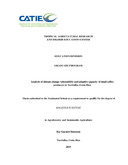Analysis of climate change vulnerability and adaptive capacity of small coffee producers in Turrialba, Costa Rica

View/
Date
2019Author
Garnett Simmons, Fay
xmlui.dri2xhtml.METS-1.0.item-location
Turrialba, Costa Rica
Type
Tesis de maestría
Metadata
Show full item recordDescription
Tesis (Mag. Sc.) - CATIE. Turrialba (Costa Rica), 2019
Abstract
In 2015, the Tropical Agricultural Research and Higher Education Center (CATIE) and
the Regional Climate Change Program (RCCP) developed a rapid assessment tool to help
technicians and producers in Central America measure the vulnerability and adaptive capacity
of coffee (Coffea arabica) farms affected by climate change. Supporting this initiative, the
Central American Program for Integral Management of Coffee Rust (Hemilia vastatrix)
(PROCAGICA) provided support to develop a reference manual guiding the process in Costa
Rica, where coffee is mainly cultivated by small producers who represent 97% of the total coffee
producers (ICAFE, 2018).
The present study was conducted between October 2018 and May 2019, and focused on
applying the rapid assessment tool on 26 coffee farms (Organic, Agrosustainable and
Conventional Systems) that belong to members of the Apoya Naturalba Coffee Association
situated in Turrialba, Costa Rica. The purpose of the study was to determine the vulnerability
and adaptive capacity of the farms using the rapid assessment tool, farm surveys and a
participatory workshop. The data which was gathered, tabulated and analyzed with the use of
features in Microsoft Excel and INFOSTAT (2012). Frequency tables, Contingency tables and
Correspondence Analysis were used to analyze the data.
Youth involvement in coffee activities was low to absent. The producers planted 8 or
more traditional and improved varieties as well as diverse crops; and had a few small stock
animals. The findings demonstrate that the farms are in 4 categories; Critical vulnerability and
adaptive capacity; Average critical vulnerability and adaptive capacity; Regular vulnerability
and adaptive capacity; and lastly, Moderate vulnerability and adaptive capacity. The most
important limitations to coffee production were temperature increase (100%) and irregular
rainfall (100%). Statistical analysis demonstrated that based on the sample size used; there was
no association between the Category of Vulnerability and Adaptive capacity and the number of
practices implemented on the farm. Neither were there any association between the number of
practices and the type of system implemented by the producers.
Keywords
Asesor
Virginio Filho, Elias de Melo
Publisher
Centro Agronómico Tropical de Investigación y Enseñanza (CATIE)
URI (Permanet link to cite or share this item)
https://repositorio.catie.ac.cr/handle/11554/9281Collections
- Tesis [1392]

